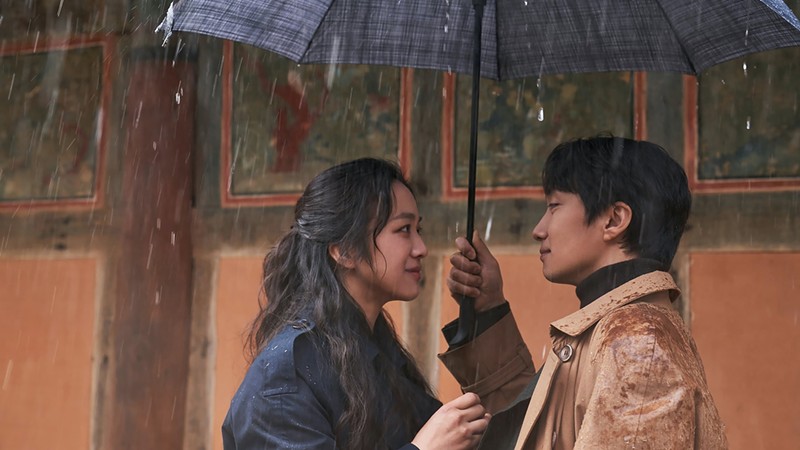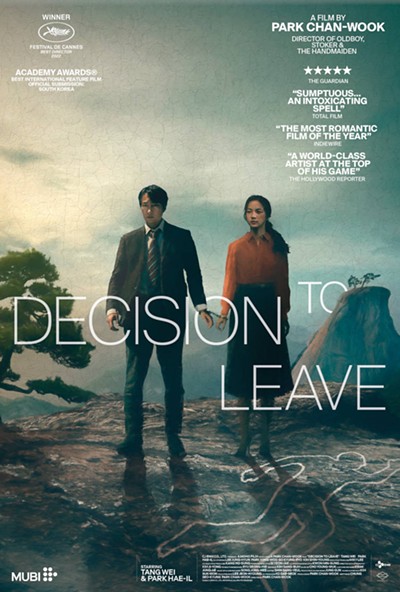
Best-known for 2003’s Oldboy and too overlooked for 2016’s baroque chamber drama The Handmaiden, Park Chan-Wook has been leaving filmmakers across the globe sprinting after his coattails for years. Cynical without succumbing to self-seriousness, politically astute but never hammy, and a brilliant stylist devoted to evocatively rendering each of his genre-inflected tales, it seems only natural that he’d feel at home with something resembling noir. With his latest, Decision to Leave, he’s done wonders with a story many many peers have made far less of, enlivening familiar tropes with a restless devotion to variety, atmosphere, and a certain wry circumspection that could hardly feel more natural. This brand of cynicism feels (as ever) a proper match for noir: something Park renders as he ought to, expressing a worldview that rises both from and past a set of stylistic conventions.
“Your Korean’s better than mine,” says Detective Hae-jun (an alternately earnest and steely Park Hae-il), the insomniac lead character of Decision to Leave’s existentially wandering romantic mystery. The second-person subject of the statement, Seo-rae (played with fluid versatility by Tang Wei) is also an object of police investigation: a suspect in the death of her husband who fell (or something) from a solo climb up a steep, slippery cliff face and, before long, quite a bit more.
Such a remark is typical for Park (see The Handmaiden), who’s long observed brilliantly the ways that language, taste, and culture enmesh themselves in the workings of both interpersonal and global power: varieties of a single force never cleanly cordoned off from one another. In this case, expatriate fantasies — here, the idea that Seo-rae, who’s Chinese, should feel somehow out of her depth — meet political and personal realities, leaving Hae-jun taken aback at her coolness but somehow in denial of her as a formidable, self-possessed force. Her coolness at her husband’s death only leaves him more so, stirring intrigue within him that goes well beyond the case.
Their relationship, and the hazy circumstances which surrounded his death, are for much of Park’s film (which he co-wrote alongside Jeong Seo-kyeong as well as directed) enveloped in a literal and figurative fog. More than a tonal feature, water suffuses Park’s film in the forms of mist and waves, seeming to move as a substance even beyond itself. Digital exteriors are photographed with a kind of blue-green filter (or perhaps post-production grading), with more saturated cool tones stitched strategically into key places within the frame. Park’s interiors are only so different, shadowed in the manner of antique aquariums — with splashes of more saturated hues and tinted lights serving to guide the eye. This results in a film whose characters — especially Detective Hae-jun — seem to be fumbling about and out of depth, never quite settling into a place of comfort. With the movement of waves, rain, and floods being both unpredictable and inevitable, the film’s guiding stylistic motifs grant it a sense of unity and certainty, with Park’s assuredness in style guaranteeing that he’s steering things, unlike his lead, with a clear sense of orientation.
This sensibility proves freeing, too, enabling a story which might normally risk lapsing into vagueness to traverse different sorts of scenes with a sense of holistic unity in tone. Brilliant set pieces pepper the film’s progression (though no scene ultimately lacks in visual interest or style) — creating a welcome sense that Park’s incorporating a broad but authoritatively controlled range of tones. Cinematographer Kim Ji-yong’s camera shifts readily between movement and stasis, stability, and jitters, depending on the demands of a given scene. Working more with zooms than do many of his contemporaries, Park’s background in action filmmaking gives him a sense of liberty even in the film’s more contained, intimately scaled scenes.
But this sense of freedom —– epitomized in a whirlwind knife fight atop a construction site that feels credibly rough and improvisational, but extending throughout the fabric of the film — feels finally and purposefully contained by an air of misty ambiguity. Damning his characters to not move in isolation, but always through or against something, wincing or squinting to even move or see, Park hems his characters into close but never fully familiar quarters, on a shared existential plain.
This is truer nowhere than in the film’s gutting depictions of romantic intimacy. With the film’s central relationships defined by uneasy assertion and sharing of knowledge, trust, and power, Decision to Leave frames what might be a source of comfort as yet another alien landscape of quasi-martial risk-taking and strategic reserve. Aligned as the viewer is with the ever-weary Hae-jun, there’s a rich and touching, yet faintly comic sense of his own impotence. Police work and romance alike here involve a sense of partial knowledge and comfort punctuated by intermittent fits of scrabbling — with a certain form of male egotism lampooned in a particular standout scene which nods to Hitchcock’s Vertigo. Within this sphere, a world which always feels quietly pressurized from without and circumscribed, power can be asserted only in defiance of an obvious need for succor and for help.
If such themes feel familiar, essentially evergreen, then that’s as they should be; security and certainty being but two of society’s foundational myths. The difference between Park’s work and so much else — and especially so many other police stories — is that he knows them for what they are. Lately, that’s come, along with so much of what he does here, to be a bit of a forgotten art.
Film Details
Stay connected with Detroit Metro Times. Subscribe to our newsletters, and follow us on Google News, Apple News, Twitter, Facebook, Instagram, Reddit, or TikTok.


